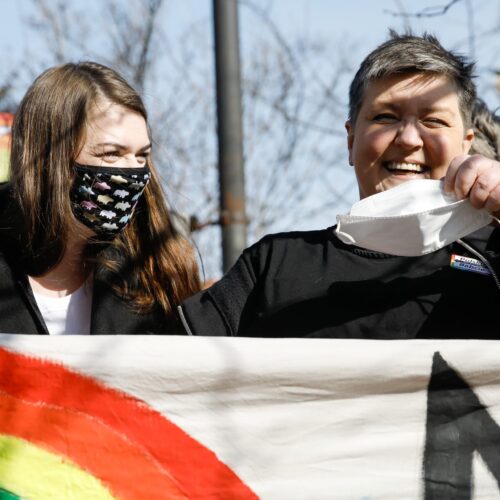‘Rainbow Mary’ Case Crucial To Future Of Free Speech In Poland
This statement can be attributed to the Clooney Foundation for Justice. For further inquiries, please contact [email protected]

© Photo by REUTERS/Kacper Pempel
The prosecution of three female LGBTQ+ rights activists charged with “offending religious feelings” was discriminatory and violated their right to freedom of expression, a TrialWatch Fairness Report said today. The charges—brought under Article 196 of the Polish Criminal Code—were based on the fact that the activists, Elżbieta Podlesna, Anna Prus, and Joanna Gzyra-Iskandar, had put up posters showing the Virgin Mary with a rainbow halo.
The Report, co-authored by Professor Lisa Davis and staff at the American Bar Association Center for Human Rights, commends the court for acquitting them and urges the court of appeals to affirm their acquittal; the Report further stresses the importance of protecting the independence of the judiciary in Poland, without which activists like these will not only continue to be prosecuted, but could be convicted.
Despite their acquittal, the prosecution violated the defendants’ rights. Prosecution witnesses compared the rainbow flag to a swastika, making clear the discriminatory impetus driving the case, and referred to a “homolobby” in discussing why the image was allegedly offensive to Catholics. The prosecution has appealed the case and an appeal hearing has been scheduled for November 10.
“While the defendants were acquitted, they should never have been prosecuted in the first place,” said Professor Lisa Davis, the TrialWatch expert on the case. “The charges were brought to discriminate on the basis of sexual orientation and gender identity.”
The trial, which was monitored by the ABA Center for Human Rights as part of the Clooney Foundation for Justice’s TrialWatch initiative, reflects a trend of suppression of LGBTQ+ rights in Poland under the ruling Law and Justice Party (PiS). Since 2019, local authorities have tried to create “LGBT-free zones”; hate crimes against the LGBTQ+ community are on the rise; and those protesting against LGBTQ+ discrimination regularly face prosecution. The number of cases under Article 196 for ‘offending religious feelings’ nearly tripled from 2016 to 2020. At the same time, the independence of the Polish judiciary is under attack by the governing party. In response to escalating concerns about the rule of law in Poland, the European Commission has activated the EU’s Article 7 disciplinary process—which can result in the suspension of the rights of an EU member state.
The three activists put up their posters in response to a church installation that said that “LGBT,” “Gender,” and “Homodeviations” were crimes or sins.
“I was so sad and angry when I saw that,” said Prus, talking to CFJ. “Really at that time we were thinking mostly of LGBTQ+ youth. We wanted them to wake up in the morning and see the rainbows and know they were not alone.”
The Fairness Report finds that the case was brought because of the “accused’s activism on behalf of the LGBTIQ+ community”; for instance, the indictment explicitly says that the rainbow halo should be deemed insulting because of its links to the LGBTQ+ community. By contrast, the court properly held that it is “not an insult … to create or disseminate even a controversial image in order to stimulate or contribute to a public debate on a specific, sensitive or important topic.”
“The court’s decision sets an important precedent, which should be affirmed on appeal and applied by other courts,” Professor Davis concluded. “Moreover, this case shows how important it is that Poland’s judiciary remain independent in order to combat discriminatory prosecutions such as this one.”
Background
In April 2019, Podlesna, Prus, and Gzyra-Iskandar put up posters showing the Virgin Mary with a rainbow halo near the Church of St. Dominik in Plock, a city in central Poland. The week before, an Easter installation at the church had expressed anti-LGBTQ+ sentiments—calling homosexuality and “gender” sins. A priest from the church complained about the posters and a few weeks later, the police raided Podlesna’s apartment and detained her for several hours, taking multiple electronic devices with them. Prus told CFJ she and Gzyra-Iskandar turned themselves over after the raid.
The three activists were charged with violating Article 196 of Poland’s Criminal Code, which provides that “[w]hoever offends the religious feelings of other persons by publicly insulting an object of religious worship, or a place designated for public religious ceremonies, is liable to pay a fine, have his or her liberty limited, or be deprived of his or her liberty for a period of up to two years.”
The priest who complained, Tadeusz Łebkowski, joined the case as an “auxiliary” prosecutor alongside the government prosecutor and a well-known anti-LGBTQ+ activist, Kaja Godek, who also served an “auxiliary prosecutor.” At trial, their statements—which included likening the rainbow flag to a swastika—made clear their discriminatory motives. Referring to the rainbow flag, Łebkowski stated: “behind these colors on the streets you can see a disgusting, condemned content, referring to the marches and recognizing that the intercourse of two men is a disorder, a deviation, and the orientation should be treated.”
The court acquitted the activists, finding that the prosecution had not shown that they intended to harm religious feelings, as was required by Article 196. The court also found that the defendants’ posters were not “hate speech, did not incite violence, [and] did not intimidate other people,” thus “remaining within the limits of the legally protected freedom of expression.” The prosecution has appealed the defendants’ acquittal.
In the Fairness Report, Professor Davis said Poland should repeal “Article 196 and other laws functionally criminalizing expressions of solidarity with the LGBTIQ+ community.” She further urges the international community to continue to resist Polish “efforts to rollback judicial independence, including through sanctions such as those envisioned by the European Union’s Article 7 disciplinary mechanism.”
For an interview with activist Anna Prus, please click here.